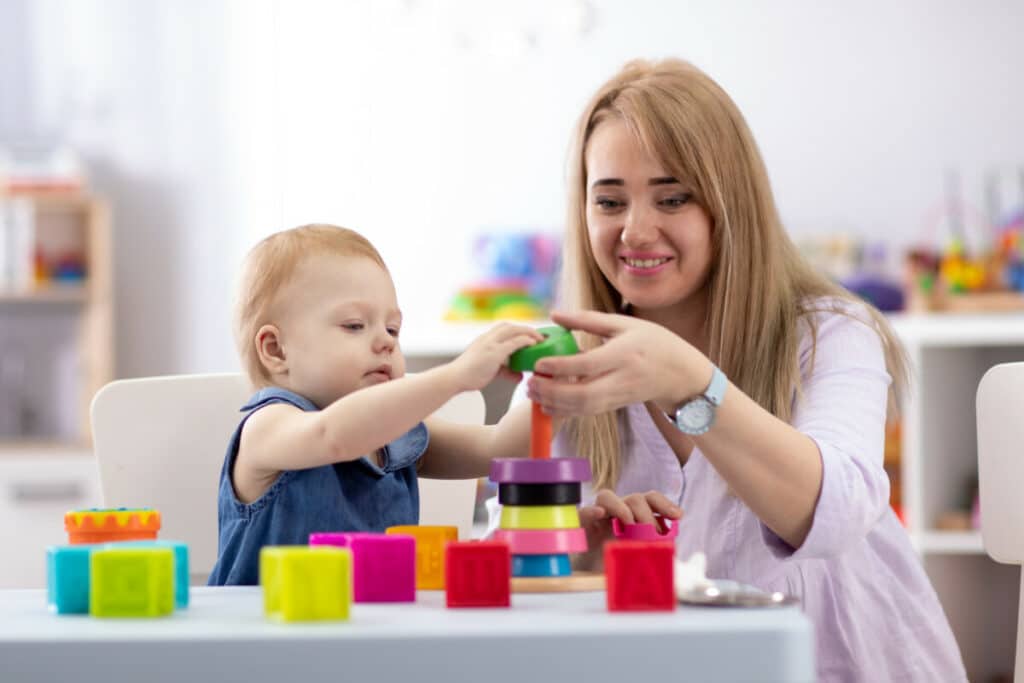Daycare vs Stay-at-Home: 11 Pros and Cons
Parents are often worried about doing what is best for their children, whether it be stressing over sending them to public school or homeschooling, or any other one of the many situations you have to make a decision on. So what about even earlier? What about preschool? Should you send your child to daycare? Keep them at home?
So how can you balance these pros and cons? What do they really mean? Let’s dive a little bit deeper.
Daycare
Pros
1 – Social:
The social aspect of daycare is a great benefit. Children who are only children, or do not have any siblings within five years of them, can often suffer socially because of their lack of experience with kids their age. Regularly going to daycare and being around other children can help them develop quickly, as well as safely.
Most children this age are working on their social skills, so the daycare workers will be looking out for them in this aspect especially. This will help them solve disagreements, handle disappointment, and learn to share much faster than if they were not exposed to other children.
The social part of daycare can also benefit parents. It is much easier to raise children if they have friends and you surround yourself with a support system of parents. Meeting parents with children the same age as yours can help both you and your child.
2 – Educational Play:
Daycares have loose schedules and plenty of resources to keep your children occupied in a productive way. The toys they have often have a purpose, and if they don’t they are still supplemented with craft time, stories, or other structures that can help your child develop in many ways.
This is something you would not get from a stay-at-home experience. Providing children with craft supplies can be expensive, so having crafts planned and supplied by daycare is a great service.

Cons
3 – Cost:
Obviously, daycares come with an enrollment fee. This price depends on the quality of the establishment, as well as where you live, but daycare or preschool can range from $370 to $1,100 monthly. Having your child stay at home with you will eliminate this fee, but take more of your time as well as prevent you from working yourself.
There are plenty of debatable costs and benefits to this, especially depending on what you do for work. If your work pays well and you can still earn a profit after the cost of daycare, it might be good to pay that price. However, if your job is simply a supplemental source of income for your family and will not cover the cost of daycare, it is important to take that into account as well. In the end, it is up to you and your budget.
4 – Exposure:
You cannot control the type of children your child will meet and the backgrounds they come from. This, of course, is not always a bad thing. They can be exposed to many different ways of life which can be very beneficial for a child’s development and sense of worldview.
However, if you are in a household with specific views or ideas you want to wait to introduce to your child, you run the risk of early exposure when sending your child to daycare. This could present you with a child who wants to experience things they had never even thought of before. As stated before, this is not necessarily bad but can be difficult to navigate for some families.
This is not a problem often thought of when considering sending your child to daycare but is important to note. Your child will get sick a lot more often while being sent to daycare. Increased exposure in daycare does not stop at concepts or arguments – it includes disease as well.
Many think of this as a good kind of exposure, because the illnesses are not often serious and can help build up your child’s immune system faster so they avoid getting as sick when they enter kindergarten. However, it is always something to consider, especially if you have a child with a weaker immune system or need to be more careful due to an existing illness.
Stay-At-Home

Pros
5 – Cost:
As mentioned above, staying at home with your child yourself can be very cost-efficient. It is likely not much more expensive than having them home only half of the day. Food cost stays the same and they will feel comfortable at home due to familiarity. This is obviously not an option for every family. Some parents do not have the option to stay at home, be it due to a need for higher income or a problem a single parent has to face.
6 – Control:
You have the most control over what your child experiences in your own household, be it when you stay home with them or hire your own nanny. You can give your nanny a rigorous list of things for your child to do. If you want your child to develop their reading skills at an earlier age, you have that option. If you want your child to not be exposed to television, you have this level of control when your child stays at home.
7 – One-on-One Time:
When hiring a nanny, or teaching your child at your home yourself your child will benefit greatly from one-on-one time. This is because any of your child’s schedules can be adapted to their specific needs and all your or your nanny’s attention will be directed to your child. This might not help them develop social skills with their peers, but it can help them develop many other skills as well as help you learn what they might struggle with and help them overcome these struggles.
8 – More Experiences:
Due to the individualized nature of stay-at-home care for your child, they can experience much more. They can go to the park daily, take field trips to aquariums, museums, and many other places that can stimulate learning, or simply allow them to experience new things.
Cons
9 – Cost:
Nannies tend to be more expensive than daycare. So while one form of stay-at-home learning can be cost-effective, it can also be even more than daycare. It also depends on if you hire a professional nanny versus someone like a babysitter. This cost is something to consider.
10 – Social:
This con is simply a direct comparison to the pro of daycare. Your child will not develop the same social skills they would if enrolled in daycare when staying at home. This can obviously be supplemented by playdates with others and can help them there, but the presence of their parents often hinders a child’s ability to communicate and problem-solve on their own.
11 – Resources:
Stay-at-home care will have fewer resources at its disposal. This is not to say a child will experience less when staying at home, as stated above, but it is something to consider. Often daycare teachers and staff have resources and training that allow them to utilize tools to their fullest and teach children effectively. These skills may not be crucial in a child’s development, but it is something you lose when a child stays at home.

